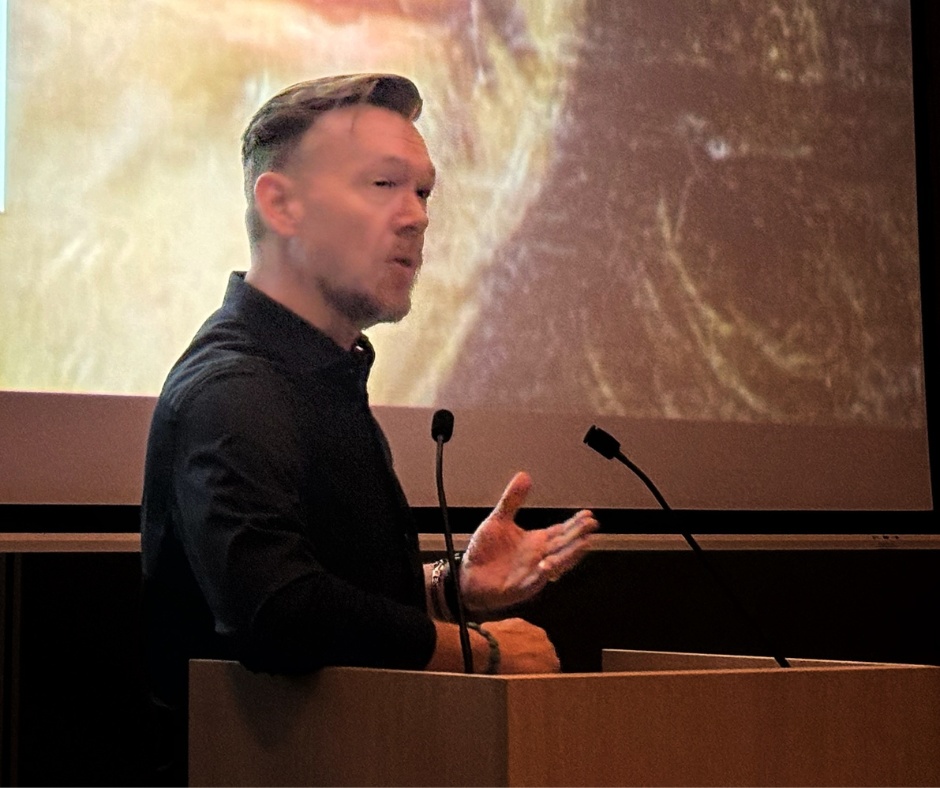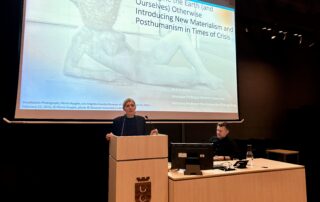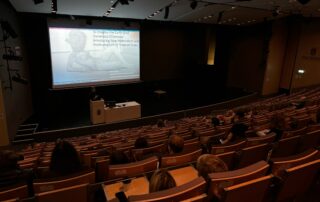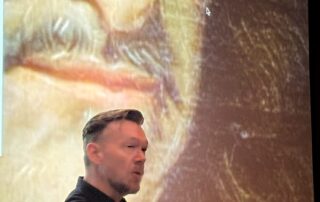Nearly fifty professors and students attended Professor Rick Dolphijn’s lecture ‘To Imagine the Earth (and Ourselves) Otherwise’ on 17 November 2023 to hear about new materialism and posthumanism in times of crisis.
The lecture was organised by the Centre for Sustainable Development in cooperation with the Memling Research Centre. The guests in the Theatre Hall of the Faculty of Philology at the University of Gdansk were welcomed by Irena Chawrilska, PhD, coordinator of the Culture (for) Sustainable Development programme at CZRUG. It was on her initiative that the event was organised.
The researcher introduced Professor Rick Dolphijn, who is an associate professor at the Faculty of Humanities at Utrecht University and an honorary professor at the University of Hong Kong (Faculty of Arts), and published widely on continental philosophy (Gilles Deleuze and Michel Serres) and the contemporary arts. His research interests include posthumanism, new materialism, material culture (food studies), and ecology.
During the lecture ‘To Imagine the Earth (and Ourselves) Otherwise’ Dolphijn introduced spoke of how current transdisciplinary developments in academia (like new materialism and posthumanism) are more and more offering alternatives to the “humanism” that has been so formative for academia at large in the past 200 years. With examples from medicine, law, biology, feminism and postcolonial, he showed that our current “time of crisis”, very much defined by how the ecological crisis forces us to look at the world and ourselves differently, has an immense impact on how the more-than-human perspective is gaining momentum in all areas of research. But apart from offering a different and more inclusive view upon ourselves, this new materialist and posthuman perspective also allows us to the world around us differently. Here, also the contemporary arts (from literature to sound art to performance art) has a lot to contribute. Ending with some examples on how contemporary sounds artists (often with a very technical training) were developing sound equipment that allowed us to listen to noises that had been ‘unheard’ by humans until recently (but that tell us a lot about how far-reaching human caused ecological changes, are changing our world, Dolphijn opted for a revaluation of the arts throughout academia. Coining his approach cosmophilosophy (thinking ‘order’ beyond the mere human perspective) he aims to develop and analyse those transdisciplinary strategies ready to meet the (ecological) challenges of the 21st century.
What is the CZRUG Culture for sustainable development programme?
In the Culture for Sustainable Development Programme, CSDUG creatively ponders the role of culture in the attainment of the Sustainable Development Goals. Agenda 2030 as a strategy for the world still stands and the university’s goal is to create new ideas and in the end develop solutions on the path towards a sustainable future and empower communities to response-ability for their communities and land as Donna Haraway states. New narratives, ways of thinking and innovations can only emerge through negotiation. Making worlds collectively enables humans to look around rather than ahead. Making worlds happens also beyond the humans, within the ecological systems in which each organism has potential to operate as a change agent towards sustainability.
We hope that, thanks to Professor Rick Doolphijn’s lecture, we have had the opportunity to once again (within our programme) raise important questions and start a discussion on the narratives through which we can open up and negotiate a new future towards sustainability.





